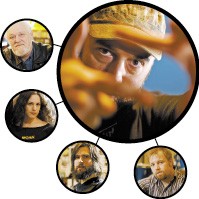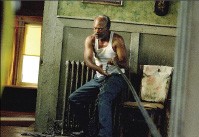California to Memphis is an unconventional move for a trained theater director and aspiring filmmaker, but, in 1994, Craig Brewer, in town for the funeral of his maternal grandfather, ex-big-league ballplayer Marv Throneberry, decided to make it.
Brewer says he found his artistic voice in Memphis, especially in the region’s rich music culture. “It’s Memphis music that’s rescued me many times,” Brewer says today, speaking of more than merely his art.
Whether moving to Memphis — the family home he visited every summer growing up — allowed Brewer’s ascent or delayed it will never be known, but a decade after his relocation, in January 2005, Brewer found himself at the epicenter of the film world when his second feature, the Memphis-rap-themed Hustle & Flow, set off a bidding competition among Hollywood studios and won the audience award at the Sundance Film Festival.
With a long-sought, hard-won shot at a viable big-time film career before him, with his options seemingly limitless, what would Brewer’s next step be? Helming a potential commercial franchise? How about cashing in with a director-for-hire project attached to a big star? For Brewer, the answer turned out to be Black Snake Moan, a pulpy Southern Gothic tale in which a white “nymphomaniac” spends much of the movie chained to the radiator of a black blues singer’s farmhouse.
The rollout for Brewer’s unavoidably controversial and sneakily personal second act started with a triumphant return to Sundance in January and continued this week with a New York premiere Monday, February 19th, and a homecoming premiere at downtown’s Muvico Peabody Place Theatre Thursday, February 22nd. Black Snake Moan will open around the country Friday, March 2nd. (Our review of the film will be in next week’s Flyer.)
The 35-year-old Brewer says he saw the opportunity provided by Hustle & Flow‘s Sundance moment not as a chance to play it safe but as a rare opportunity to get this risky movie made.
“I know it probably wasn’t the safest movie to do, but I thought it was the only time in my career I could get Black Snake Moan made,” Brewer says.
“After the big opening at Sundance, all the studios wanted to meet with me,” Brewer says. “But I always knew that Hustle would be a commercial for me for the rest of my career. No matter what movie I made after Hustle & Flow, I could go to a studio and say, okay, I’ll sell out. I’ll do a big movie and make it as fun and entertaining as Hustle & Flow. But I knew I would have the leverage now to do something that the studios might be fearful of doing. And the leverage I had was that the studios all passed on the script of Hustle & Flow.”
Brewer calculated that those studios wouldn’t risk making the same mistake twice and used the opportunity to make a movie Hollywood would never have considered had Brewer not proven them wrong on Hustle & Flow.
The script for Black Snake Moan was already finished by the time Brewer exploded onto the Sundance scene. (“The most important thing in Hollywood is to have a script,” Brewer says. “There are plenty of ideas and concepts and all that kind of crap, but if you have a script, that means you can have a budget. That means you can make it.”)
The story of three damaged souls — a young woman (Christina Ricci) whose sexual addiction is rooted in a history of abuse, her sensitive boyfriend (Justin Timberlake) plagued by anxiety attacks, and a blues singer (Samuel L. Jackson) whose wife has just left him — colliding in rural Mississippi, Black Snake Moan wasn’t just written in the period Brewer was struggling to get Hustle & Flow made. In many ways, that’s what it’s about.
The blues element of Black Snake Moan comes from a love of the genre and its culture Brewer has had since he bought Muddy Waters’ Hard Again at a Beale Street record store at age 14 after hearing “Mannish Boy” in the movie Risky Business. But the guts of the story are more personal.
Where Hustle & Flow was partially about the making of Brewer’s self-financed debut, The Poor & Hungry — the “demo tape” he used to get noticed — Black Snake Moan was partly inspired by the years-long process of getting Hustle & Flow made, a period marked by what Brewer calls “crippling anxiety attacks” and, he admits, marital difficulties.
The end result is a movie that’s deeper, more intimate, and more sincere than the film’s gonzo exploitation-style marketing suggests.
Brewer, a Tennessee Williams and Flannery O’Connor fan who embraces the pulpy aspect of his film (the notorious Elia Kazan/Williams collaboration Baby Doll was a key influence), not only approves of the flamboyant marketing, he pushed for it.
“This is not a movie that’s without its titillation and taboo,” Brewer says, “and I didn’t want to wear my heart on my sleeve in the poster. So I told [the marketing department] to go Conan the Barbarian on this. I told the studio, please give people permission to enjoy the movie. The studio asked, How do we sell this? And I said, We sell the camp.”
The camp is there, but Brewer roots his vibrant central conceit in an otherwise normal world, which gives the audience entrée to a setting they might otherwise be reluctant to enter.
“[Supporting characters] Reverend R.L. (John Cothran Jr.) and Angela (S. Epatha Merkerson) are people who recognize the absurdity of what’s happening,” Brewer says, “and we are thankful that they’re there to help us recognize the absurdity. But it’s important that those characters make a step toward the absurdity.” And bring the audience along with them.
 Justin Fox Burks
Justin Fox Burks
Craig Brewer and his Memphis character actors Jeff Pope, Jason Freeman, Amy LaVere, and John Still
“I really like being in movies where people react and laugh, and they are being played to,” Brewer says. “I’m hitting beats, and if I hit those beats, I can take my story in any direction I want. And because there is a continuity and a context to those emotional beats, people find that they will accept it, they’ll go the extra distance with it.”
Brewer’s films seem to occupy space at the intersection of art house and exploitation, but, at heart, they are mainstream entertainments. That Brewer unleashes his crowd-pleasing instincts within the realm of relatively low-budget films about “gritty” subjects seems to feel untrustworthy to his critical detractors.
“There are times that I feel like a bat, like I’m neither bird nor beast. Hollywood thinks that I’m way too out there sometimes. I’m the crazy guy from Memphis who makes the movies about pimps and whores and nymphomaniacs and bluesmen. And yet, here at home, I’m kind of a Hollywood sellout,” Brewer muses.
“And when I go to Sundance, the critical line is: ‘How could people call this independent cinema? How can people call this an entertaining movie that encourages us to laugh and suspend some elements of belief — how can we call this real?’ And I guess I just don’t think about it much.”
Black Snake Moan has been written about recently in the context of ’60s and ’70s exploitation movies, but spend a little time with Brewer and you pick up on a different model for his past two films: the perhaps underrated commercial “B” movies of the 1980s.
Talking to Brewer at the South Main offices of his Southern Cross the Dog production company last weekend, the director says that his three “formative cultural moments” were Herbie Hancock’s “Rockit” video, Michael Jackson’s moonwalk on the Motown 25 television special, and the revelation of Apollonia Kotero’s ample bosom in Purple Rain. And, instantly, the conversation spurs Brewer to pop a DVD of Purple Rain into the player, dim the office lights, and play the movie’s opening credits for the visiting writer and photographer. Brewer stands up the whole time, playing air-guitar, dancing, and excitedly commenting on the opening sequence as it plays — teasing out and making obvious the artistry in a piece of filmmaking not usually taken so seriously. You get a sense of how energetic Brewer’s studio pitch meetings must be.
And references to other modest but mainstream ’80s flicks emerge in casual conversation with the director: Norma Rae, Coal Miner’s Daughter, Urban Cowboy, Footloose, Flashdance.
What’s refreshing is that Brewer appreciates these movies not as kitsch or nostalgia but for the underrated entertainments — and, yes, works of art — that they are, and the more you absorb his enthusiasm, the more you see the connection to the kind of movies he’s made. There’s a storytelling integrity and pulpy excitement that Hustle & Flow and Black Snake Moan have in common with those ’80s films that contemporary Hollywood equivalents don’t share.
“The thing about all those [films] is that they’re truly working-class movies,” Brewer says later. “The objective in An Officer and a Gentleman is not to shoot down MiGs. It was for him to graduate. The objective of Flashdance, another very important movie to me, is not to dance in the big show and make everybody stand up and applaud. It was to get into the school. Footloose was about a high school dance. They’re simple objectives, and you might think, well, anybody can do that. But they’re not simple objectives. That’s why it’s very important to me and why I always take exception when people say, oh well, [Hustle & Flow protagonist] DJay turned into a star. And I say, no, no, no. The only goal was to get something in the hands of somebody. But really the victory in Hustle & Flow is getting this song played on the radio. Once.”
That Brewer identifies with these underdog stories doesn’t seem at odds with his recent success. Brewer moved from California to Memphis to forge a film career, and, now that he’s got one, he’s remained in Memphis. Brewer now has an apartment in L.A. overlooking the Hollywood hills for when he has to be on the West Coast, but he insisted on having his production office in Memphis instead of on the Paramount lot and lives in a modest Midtown home with his wife Jodi and 5-year-old son Graham.
The Brewers did splurge on new rides when the Hustle & Flow check finally came in. Jodi got what Brewer calls a “souped-up Audi.” (“She drives a spaceship,” he says, though the amenities he describes — seat-warmers, satellite radio — are fairly common these days.) Brewer drives a GTO he bought slightly used. It’s white with a red double stripe up the hood, red licorice-like interior, and plenty of horsepower. Stepping down hard on the gas heading down Union Avenue, Brewer cautions: “Don’t drive one of these. You’ll buy it.”
But when asked how his life has changed in the two years since Hustle & Flow, Brewer focuses on what he can do, not what he can get.
“It’s nice to have financial stability. It’s nice to have health insurance finally,” Brewer says. “But I think the thing that I dig the most is the support and freedom to explore projects. People will listen to me. I can get anybody in Hollywood on the phone, and they want to hear what I have to say. As much as that can give someone goose bumps, with that comes a tremendous responsibility: Don’t waste their time. Don’t go down a path that you’re not willing to go all the way. The one thing I’m concerned about is getting involved with things that I’m not truly passionate about. Because it’s a war to get a movie made. It’s a two-year chunk out of your life.”
It’s a process Brewer is itching to start again for his next film, the country-music themed Maggie Lynn, which Brewer hopes to begin filming in East Tennessee later this year.
“The hardest thing about this past year is that I’m trying to get into Maggie Lynn,” Brewer says. “I’ve got a whole other girl I’ve got to fall in love with.”
Brewer’s production office is littered with hints about Maggie Lynn, and Brewer seems cheerfully unaware that the local hipster and hip-hop cultures he typically celebrates are about the last places that would appreciate the merits of such mainstream country performers as Gretchen Wilson, Kenny Chesney, and Miranda Lambert, whose magazine cutouts clutter one bulletin board as potential models for characters in the movie.
When the subject of Maggie Lynn comes up, Brewer fires up the song “The Mountain,” from local rock band Lucero, on his laptop and acts out the potential opening sequence, which culminates in Maggie dancing along to the band in concert at a dirt-bike race.
Who knows if that vision will make the big screen, but it’s typical of Brewer, whose devotion to Memphis culture is never far from his mind. He ticks off local musicians such as Lucero, Jack Yarber, Harlan T. Bobo, Amy LaVere, and Al Kapone as people he thinks deserve stardom and speaks as excitedly about War Bride, a new collaboration with longtime friend and fellow Memphis filmmaker Mike McCarthy, as he does about Maggie Lynn. (Brewer hopes to produce the film, with McCarthy directing. They’re both working on the screenplay of what Brewer dubs a “female Rambo.”)
“That’s the entrepreneur in me,” Brewer says. “I want to figure out a way to use artists in town and be successful. Yes, I want to make money, but every time I make money, my friends make money. I’ve made money for Memphis. Since my movies have been here, I think I’ve contributed $3 million to $4 million to the local economy. And there isn’t anybody in Hollywood asking how they can make movies in Memphis or in the state of Tennessee.”


 Justin Fox Burks
Justin Fox Burks